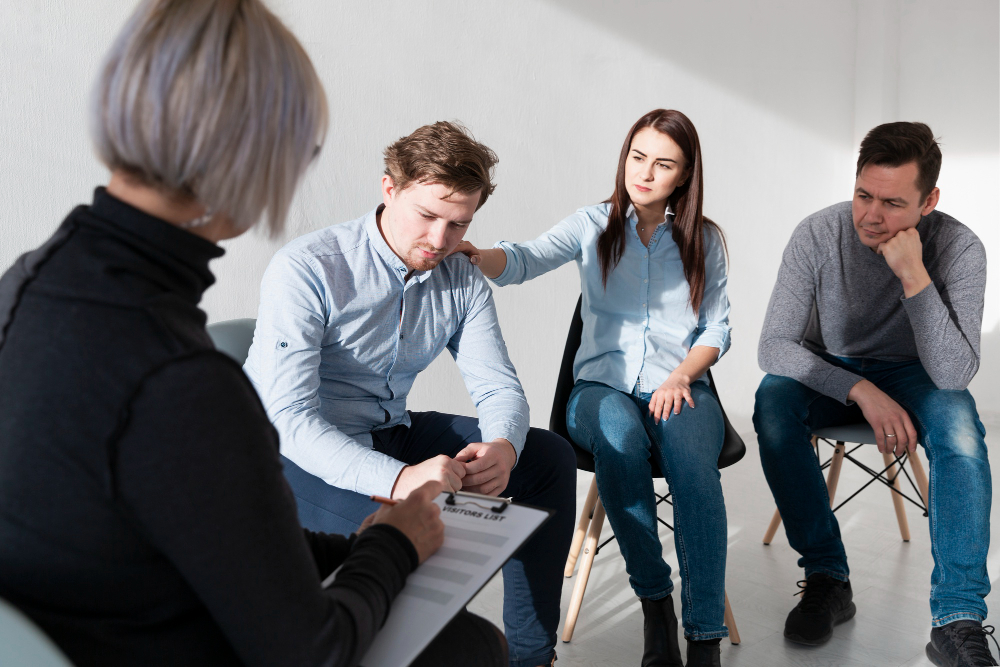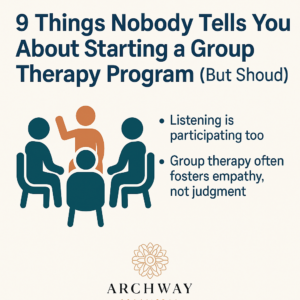You can Google all day about group therapy and still not find the stuff that actually matters. The emotional stuff. The “what-do-I-do-with-my-face-when-it’s-my-turn” stuff. I know, because I was that person—curious, maybe even hopeful, but also scared it was going to feel like one big awkward overshare.
What follows isn’t a pitch. It’s what I wish someone had told me before I showed up for my first group session—palms sweating, heart racing, brain trying to come up with a “normal” sounding reason I was there.
1. You’re allowed to say “pass”
One of the biggest myths is that you have to talk every time. The truth? Listening is participating. I spent my first two sessions mostly silent, taking everything in. And no one made me feel like I was doing it wrong. When I finally spoke up, it wasn’t because I felt forced—it was because I felt safe. That permission to say “pass” gave me the space I needed to trust the process.
2. The first few sessions are weird. That’s normal.
If walking into a room full of strangers and opening up your emotional life doesn’t feel weird at first, you might be a robot. Most of us start out awkward, stiff, overly polite. Then something shifts. Maybe it’s someone sharing something real and raw. Maybe it’s a shared laugh over an inside joke. But at some point, it stops feeling like a meeting and starts feeling like a connection. That’s where the magic is.
3. You don’t have to know what to say
I wasted so much mental energy rehearsing what I might say before each session. It turns out, you don’t need a script. Some of the most meaningful moments in group come from people fumbling through their feelings, not delivering TED Talks. It’s messy, sure. But it’s also real. And that realness is what makes it healing.
4. People will surprise you—in the best way
I had all kinds of assumptions. That guy with the tattoos and thousand-yard stare? He gave the gentlest advice I’ve ever heard. The woman who barely spoke? Her story broke something open in me. Group therapy teaches you not to judge a book by its cover—because everyone has a story, and many of them will change how you see yourself.
5. You’ll leave with phrases you can’t un-hear
There’s something about hearing your own struggle reflected in someone else’s words. I still remember the day someone said, “You’re allowed to take up space, even when you’re not okay.” It hit me like a freight train. Group therapy is full of those moments—little phrases that crack you open and start rewiring the way you think about yourself.
6. You might cry in the car after
Sometimes I cried because I felt seen. Sometimes because I was emotionally wrung out. Sometimes because someone else’s story unlocked something I didn’t know I was carrying. Crying in the car became part of my rhythm—and eventually, a sign that something inside me was softening in a good way.
7. It’s not just about your “issues”
Sure, you come to group to work on stuff. Anxiety. Relationships. Grief. But what surprised me most was how much I learned about being human. I learned how to hold silence. How to offer comfort without fixing. How to sit with someone else’s pain. It wasn’t just therapy—it was emotional education.
8. You get to grow at your own pace
There’s no scoreboard. No one is ranking your healing. One week you might have a big breakthrough. The next, you might just show up and breathe. That’s valid. At Archway Behavioral Health, the structure supports pacing yourself. They understand that change doesn’t look the same for everyone. And that’s not just okay—it’s expected.
9. It’s okay to not be sure you need it
I didn’t hit rock bottom. I didn’t have a dramatic reason to be there. I just had this gnawing sense that life could feel better. That maybe I could feel better. Group therapy welcomed me without asking me to prove my pain. That acceptance was the first step toward healing I didn’t know I needed.
When You’re Ready, We’re Here
If you’ve been thinking about trying group therapy—even if you’re not sure it’s “bad enough” yet—trust that curiosity. At Archway Behavioral Health, we meet you where you are. No pressure. Just a place to be real.
📞 Ready to talk it through? Call us at (888) 530-0227. We’re here to help you find what works—for you.
FAQ: Starting a Group Therapy Program
What happens in a typical group therapy session?
Most sessions involve a mix of check-ins, guided discussions, and open sharing. A licensed facilitator keeps the group safe and on track. You’re never forced to speak, and you can always choose how much to share.
Do I have to share my whole story?
No. You share what feels right for you, when it feels right. Some people speak more, others less. Listening can be just as healing as talking.
How many people are in a group?
Most groups at Archway Behavioral Health have 6 to 10 participants. That’s small enough to feel intimate but large enough to offer a range of perspectives.
Will people judge me?
It’s natural to worry about this. But group therapy often fosters the opposite experience: empathy, not judgment. You’ll likely be surprised how quickly walls come down.
What if I miss a session?
Life happens. Most programs understand that. Communicate with your facilitator if you need to miss a session—they’ll guide you on how to stay connected.
Is group therapy really effective?
Yes. Studies show it can be just as effective as individual therapy, especially for people struggling with isolation, anxiety, or relational challenges.



